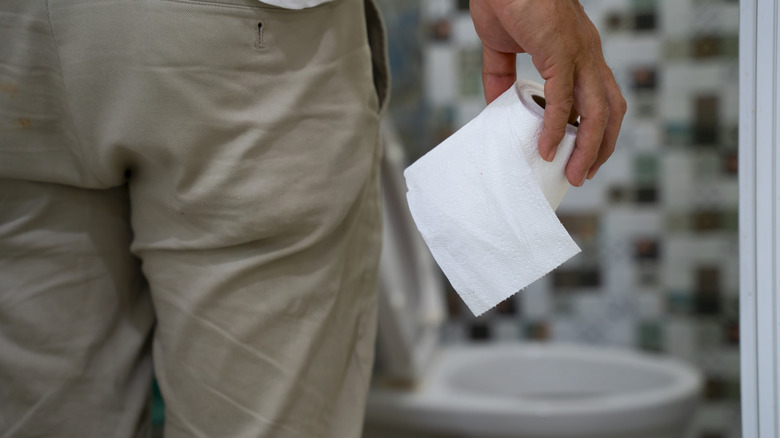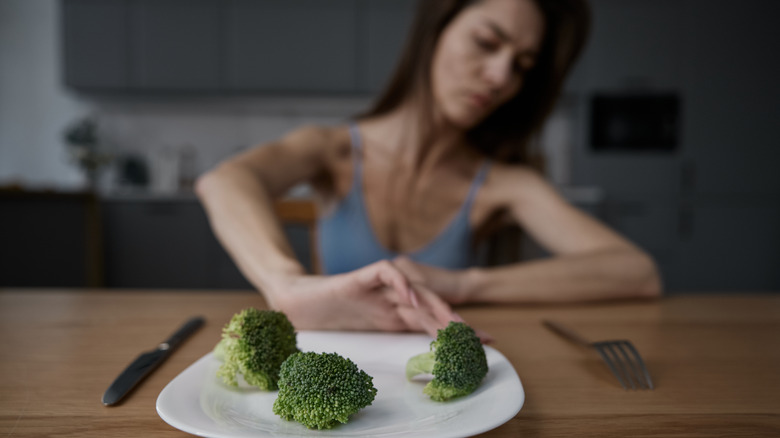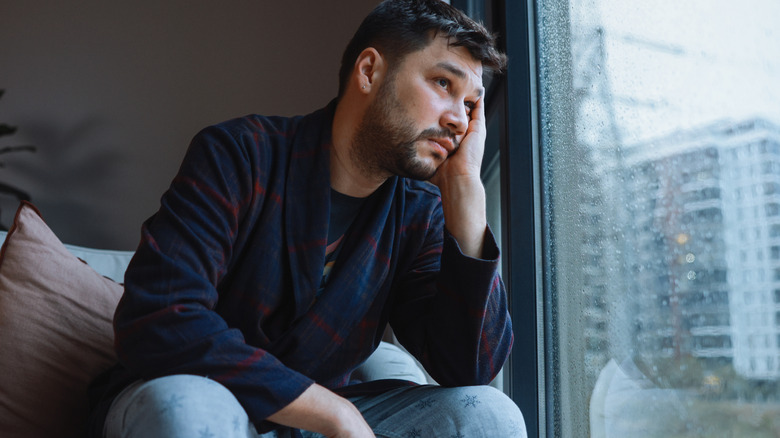What Happens To Your Poop If You Don't Eat Enough Food
There are plenty of questions you might wonder about your body but think are too weird to ask. For instance, what would happen if you didn't eat enough — or any — food? Aside from becoming malnourished over time (and finding out what happens to your body when you are malnourished), would you eventually stop having bowel movements?
It's actually a perfectly reasonable assumption to think that you'd have to consume normal (or some) amounts of food to have a "number two." However, the general answer is that you wouldn't stop needing to buy toilet paper if you ate little to no food. The reason lies in the makeup of your fecal matter: A normal stool consists of more than just food waste. In fact, around 75% of feces is water. The remaining 25% is a mixture of undigested matter, human cells, bacterial organisms, and juices involved in the digestive process.
Since these would go through your digestive tract regardless, you would still need to use the bathroom. In other words, you'd see stool in the toilet regardless of how few calories you ate. (If you look before you flush, that is. As a 2003 study in the European Journal of Gastroenterology and Hepatology showed, 27% of people admit that they do.)
Stool consistency on extremely restrictive diets
This doesn't mean that your bowel movements wouldn't look different if you restricted your eating. (For the record, calorie restriction comes with hidden dangers.) You would probably notice changes, although they could vary greatly.
For instance, you might end up with bouts of diarrhea. According to a 2021 study in Advances in Nutrition, some people who've experienced starvation reported having loose stools. However, other individuals, notably those who were diagnosed with the eating disorder anorexia nervosa, struggled with constipation (stools that were hard to pass) instead.
In an interview for Women's Health, professor Dr. Niket Sonpal advised that "how your poop is affected by your diet is really all about the fiber." Consequently, depending upon which foods you ate, you might end up with more or less watery stools. Of course, if you stopped drinking water, your fecal matter would likely become more solid. Therefore, regardless of what you ate, you'd want to focus on hydration to give your bowel movements a softer consistency.
Problems linked to loss of appetite
Not eating much or any food for long periods isn't recommended. It's understandable if you get sick and it's hard for you to eat much for a couple of days. But if your appetite dwindles and you lose at least 5% percent of your body weight, you should work with a doctor to find out why, even if you're still going to the bathroom. Many physical and psychological conditions and lifestyle choices can cause people to stop eating, including infections, medications, nicotine use, and depression. (Here are some signs your diet is doing more harm than good.)
For example, a 2022 article in the Journal of Preventive Medicine and Hygiene explained that being nutritionally deficient can increase the risk of developing medical conditions such as cardiovascular disease, cancer, and metabolic disorders. Therefore, even if your bowel movements are coming, you should probably contact your doctor to figure out why you've lost your appetite.
Interestingly, if you don't eat for a while and start eating again, your bowels may take a while to adjust. In extreme cases, such as when individuals eat after long periods of being malnourished, this process could trigger refeeding syndrome. During refeeding syndrome, the delicate balance of the systems of the body may be compromised. As such, refeeding syndrome is an emergency situation that requires treatment and attention to avoid life-threatening complications so you (and your bowels) can recover.


